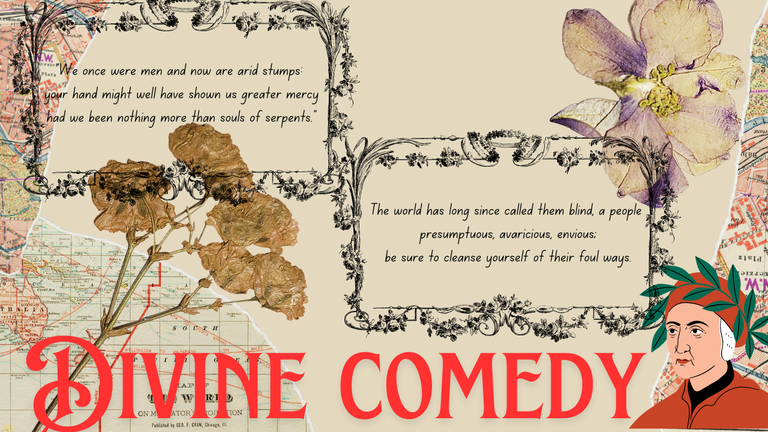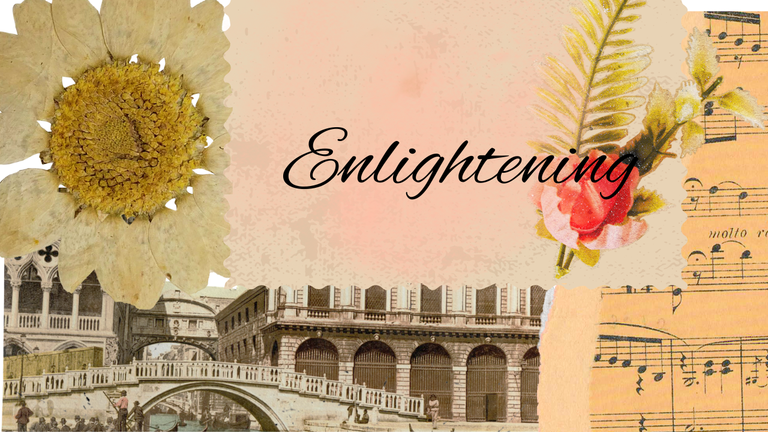
“ In truth I found myself upon the brink
of an abyss, the melancholy valley
containing thundering, unending wailings. - The Divine Comedy by Dante Alighieri

Divine comedy isn’t quite a comedy, in fact parts of the story are grim and far from something that makes us laugh. There are reasons why it’s called comedy because in literary sense, the story is indeed moving to a happy ending. However, I do quite enjoy the explanation of why it’s called “Comedy” by Dan Brown through his works “ Inferno”. He wrote that in the 14th century, literature was divided into two, one is high literature and the other is low literature. Dante wrote Divine Comedy using the common language and using vernacular that was more accessible for the general population at the time hence, it was something more that is called “comedy”. This blog is meant to be my scribbles of things I learned from the two and I hope you enjoy reading it.

There is a great source to learn about Dante from Columbia university where it has everything related to Divine Comedy. In fact, over there it is its own course. That is where I read the cantos and found it extremely beautiful. Among all the things I read and was required to read, nothing moved me more than Dante’s. I think his work was indeed geared towards the common populace, it was short yet sharp and full of interpretations.
I spent the last two days reading two, the historical fiction from Dan Brown and the actual source, Divine Comedy by Dante Aliegheri. In a sense the two intertwined because Inferno by Dan Brown uses Divine Comedy as the apparatus that moved the story. The puzzles that it has there basically are linked to all things about Dante from the artworks to the symbolism. You could also say, after reading the work of Dan Brown, Inferno, it’s more like the modern interpretation of it. Both also ended in a good/happy ending where the main character resolves its difficult problems.


There’s something beautiful about the cantos in terms of its structure. Even if you are not a classical literature reader, the work itself is moving. The very first canto of Divine Comedy is started by Dante’s narration of how he once woke up in a forest and found his newest fear that is worse than death itself. However, he also intended to tell the good thing he discovered through his journey in that realm. He eventually met someone from the time of “the false and lying gods” , a poet named Virgil that inspired Dante. He was also the guide of Dante’s exploration to the layers of hell. Both of them worked their way witnessing various ways of people and their sins being tortured and eventually moving to purgatory and paradise.
To course across more kindly waters now
my talent’s little vessel lifts her sails,
leaving behind herself a sea so cruel;
and what I sing will be that second kingdom,
in which the human soul is cleansed of sin,
becoming worthy of ascent to Heaven.
The last part of this allegory is something that feels like religious praises. For Dante, it seems like it was his revelation. However, there’s something intriguing with the Cantos 2 in Paradiso.
O you who are within your little bark,
eager to listen, following behind
my ship that, singing, crosses to deep seas,
turn back to see your shores again: do not
attempt to sail the seas I sail; you may,
by losing sight of me, be left astray.
Isn’t it intriguing that Dante tells us to pause and not follow his story again? in the next one he said something about sailing uncharted waters and are for those who wanted to learn “higher knowledge” . I guess it really has something to do with our “beliefs” because in this canto he also said something about if we have another body that could see something else beyond our physical realms.
If I was body (and on earth we can not see how things material can share one space—the case, when body enters body), then should our longing be still more inflamed to see that Essence in which we discern how God and human nature were made one.

In my opinion, Paradiso was a little complex to read but if you read twice or thrice, they become a lot more simpler, much like hell, heaven/paradise has its own levels to it. The paradiso is also answering things like “how can one get its own salvation from the sins they did”. There’s so much to unpack with this allegory and thanks to Dan Brown, he made me dive deep into Dante’s world and his cantos.

At the same time, Inferno by Dan Brown was such a fascinating book. It was written back in 2013 when the population was around 7.2 billion. Today, we have 8 billion people on the planet and according to the book, it all goes downhill from there from all standpoints. The antagonist of the story is basically saying that the only one global issue is the increasing world population and proposed the idea to reduce them, ensuring longer time for human survival. And the protagonist was tasked to resolve the plague from getting released into the world.
In retrospect, after covid outbreak and such, the population is still growing. There are more natural disasters and food security news all over. At the same time, though the news is saying that there is a decline in population, it is such an intriguing question to ask whether it is for the better or the worse if a lot of population stops and people no longer want to reproduce. It’s obviously complex but reading that book sort of gave me that prompt to ask myself and the people around me.
Both of the books were really enjoyable to read, insightful and full of new things to learn. There are also a lot of things on Hive written about it and while I have briefly come into contact with this work, I have come to appreciate it once again and am reminded why it was such an enjoyable read and how it’s always great to be inspired by someone’s greatest work.


 | 𝘔𝘢𝘤 𝘪𝘴 𝘢 𝘴𝘦𝘭𝘧-𝘦𝘮𝘱𝘭𝘰𝘺𝘦𝘥 𝘯𝘪𝘯𝘫𝘢 & 𝘤𝘰𝘧𝘧𝘦𝘦 𝘤𝘰𝘯𝘯𝘰𝘪𝘴𝘴𝘦𝘶𝘳 . 𝘈 𝘵𝘺𝘱𝘪𝘤𝘢𝘭 𝘪𝘯𝘵𝘳𝘰𝘷𝘦𝘳𝘵 𝘪𝘯 𝘭𝘰𝘷𝘦 𝘸𝘪𝘵𝘩 𝘭𝘪𝘵𝘦𝘳𝘢𝘵𝘶𝘳𝘦, 𝘣𝘰𝘰𝘬𝘴, 𝘵𝘦𝘤𝘩𝘯𝘰𝘭𝘰𝘨𝘺 𝘢𝘯𝘥 𝘱𝘩𝘪𝘭𝘰𝘴𝘰𝘱𝘩𝘺. 𝘛𝘩𝘪𝘴 𝘪𝘴 𝘩𝘦𝘳 𝘱𝘦𝘳𝘴𝘰𝘯𝘢𝘭 𝘣𝘭𝘰𝘨, 𝘢 𝘳𝘦𝘧𝘭𝘦𝘤𝘵𝘪𝘰𝘯 𝘰𝘧 𝘩𝘦𝘳 𝘸𝘢𝘯𝘥𝘦𝘳𝘭𝘶𝘴𝘵 𝘢𝘯𝘥 𝘵𝘩𝘪𝘳𝘴𝘵 𝘧𝘰𝘳 𝘬𝘯𝘰𝘸𝘭𝘦𝘥𝘨𝘦. 𝘚𝘩𝘦 𝘰𝘧𝘵𝘦𝘯 𝘤𝘰𝘷𝘦𝘳𝘴 𝘣𝘰𝘰𝘬𝘴, 𝘮𝘰𝘷𝘪𝘦 𝘢𝘯𝘥 𝘴𝘦𝘳𝘪𝘦𝘴 𝘳𝘦𝘷𝘪𝘦𝘸𝘴, 𝘵𝘦𝘤𝘩 𝘳𝘦𝘷𝘪𝘦𝘸𝘴 𝘢𝘯𝘥 𝘵𝘳𝘦𝘯𝘥𝘴, 𝘱𝘩𝘰𝘵𝘰𝘨𝘳𝘢𝘱𝘩𝘺, 𝘢𝘯𝘥 𝘱𝘦𝘳𝘴𝘰𝘯𝘢𝘭 𝘥𝘦𝘷𝘦𝘭𝘰𝘱𝘮𝘦𝘯𝘵. 𝘖𝘯𝘤𝘦 𝘪𝘯 𝘢 𝘣𝘭𝘶𝘦 𝘮𝘰𝘰𝘯, 𝘺𝘰𝘶 𝘤𝘢𝘯 𝘧𝘪𝘯𝘥 𝘩𝘦𝘳 𝘵𝘳𝘢𝘷𝘦𝘭𝘪𝘯𝘨, 𝘪𝘮𝘮𝘦𝘳𝘴𝘪𝘯𝘨 𝘩𝘦𝘳𝘴𝘦𝘭𝘧 𝘪𝘯 𝘭𝘰𝘤𝘢𝘭 𝘤𝘶𝘭𝘵𝘶𝘳𝘦𝘴 𝘢𝘯𝘥 𝘵𝘳𝘢𝘥𝘪𝘵𝘪𝘰𝘯𝘴, 𝘢𝘯𝘥 𝘵𝘢𝘬𝘪𝘯𝘨 𝘱𝘪𝘤𝘵𝘶𝘳𝘦𝘴 𝘰𝘧 𝘵𝘩𝘦 𝘣𝘦𝘢𝘶𝘵𝘪𝘧𝘶𝘭 𝘴𝘪𝘨𝘩𝘵𝘴 𝘴𝘩𝘦 𝘦𝘯𝘤𝘰𝘶𝘯𝘵𝘦𝘳𝘴 𝘢𝘭𝘰𝘯𝘨 𝘵𝘩𝘦 𝘸𝘢𝘺. 𝘚𝘩𝘦'𝘴 𝘢𝘯 𝘰𝘤𝘤𝘢𝘴𝘪𝘰𝘯𝘢𝘭 𝘧𝘰𝘰𝘥𝘪𝘦 𝘢𝘯𝘥 𝘭𝘰𝘷𝘦𝘴 𝘵𝘰 𝘦𝘹𝘱𝘭𝘰𝘳𝘦 𝘯𝘦𝘸 𝘢𝘯𝘥 𝘥𝘦𝘭𝘪𝘤𝘪𝘰𝘶𝘴 𝘤𝘶𝘭𝘪𝘯𝘢𝘳𝘺 𝘦𝘹𝘱𝘦𝘳𝘪𝘦𝘯𝘤𝘦𝘴. 𝘍𝘰𝘭𝘭𝘰𝘸 𝘢𝘭𝘰𝘯𝘨 𝘰𝘯 𝘩𝘦𝘳 𝘢𝘥𝘷𝘦𝘯𝘵𝘶𝘳𝘦𝘴 𝘢𝘯𝘥 𝘫𝘰𝘪𝘯 𝘵𝘩𝘦 𝘤𝘰𝘯𝘷𝘦𝘳𝘴𝘢𝘵𝘪𝘰𝘯! 𝘋𝘰𝘯'𝘵 𝘩𝘦𝘴𝘪𝘵𝘢𝘵𝘦 𝘵𝘰 𝘶𝘱𝘷𝘰𝘵𝘦, 𝘭𝘦𝘢𝘷𝘦 𝘢 𝘤𝘰𝘮𝘮𝘦𝘯𝘵 𝘰𝘳 𝘢 𝘧𝘦𝘦𝘥𝘣𝘢𝘤𝘬. 𝘈 𝘳𝘦-𝘣𝘭𝘰𝘨 𝘪𝘴 𝘢𝘭𝘴𝘰 𝘢𝘱𝘱𝘳𝘦𝘤𝘪𝘢𝘵𝘦𝘥 𝘵𝘰𝘰. |